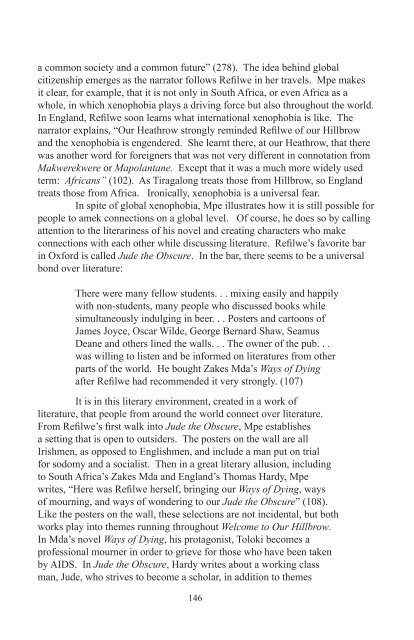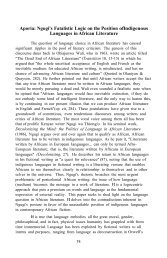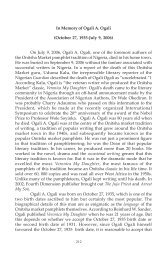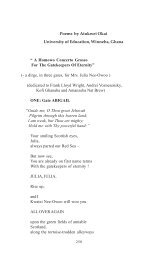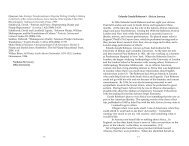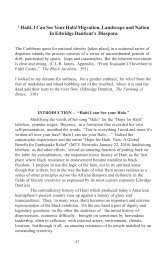Metafiction in Mpe's Welcome to our Hillbrow - African Literature ...
Metafiction in Mpe's Welcome to our Hillbrow - African Literature ...
Metafiction in Mpe's Welcome to our Hillbrow - African Literature ...
You also want an ePaper? Increase the reach of your titles
YUMPU automatically turns print PDFs into web optimized ePapers that Google loves.
a common society and a common future” (278). The idea beh<strong>in</strong>d global<br />
citizenship emerges as the narra<strong>to</strong>r follows Refilwe <strong>in</strong> her travels. Mpe makes<br />
it clear, for example, that it is not only <strong>in</strong> South Africa, or even Africa as a<br />
whole, <strong>in</strong> which xenophobia plays a driv<strong>in</strong>g force but also throughout the world.<br />
In England, Refilwe soon learns what <strong>in</strong>ternational xenophobia is like. The<br />
narra<strong>to</strong>r expla<strong>in</strong>s, “Our Heathrow strongly rem<strong>in</strong>ded Refilwe of <strong>our</strong> <strong>Hillbrow</strong><br />
and the xenophobia is engendered. She learnt there, at <strong>our</strong> Heathrow, that there<br />
was another word for foreigners that was not very different <strong>in</strong> connotation from<br />
Makwerekwere or Mapolantane. Except that it was a much more widely used<br />
term: <strong>African</strong>s” (102). As Tiragalong treats those from <strong>Hillbrow</strong>, so England<br />
treats those from Africa. Ironically, xenophobia is a universal fear.<br />
In spite of global xenophobia, Mpe illustrates how it is still possible for<br />
people <strong>to</strong> amek connections on a global level. Of c<strong>our</strong>se, he does so by call<strong>in</strong>g<br />
attention <strong>to</strong> the literar<strong>in</strong>ess of his novel and creat<strong>in</strong>g characters who make<br />
connections with each other while discuss<strong>in</strong>g literature. Refilwe’s favorite bar<br />
<strong>in</strong> Oxford is called Jude the Obscure. In the bar, there seems <strong>to</strong> be a universal<br />
bond over literature:<br />
There were many fellow students. . . mix<strong>in</strong>g easily and happily<br />
with non-students, many people who discussed books while<br />
simultaneously <strong>in</strong>dulg<strong>in</strong>g <strong>in</strong> beer. . . Posters and car<strong>to</strong>ons of<br />
James Joyce, Oscar Wilde, George Bernard Shaw, Seamus<br />
Deane and others l<strong>in</strong>ed the walls. . . The owner of the pub. . .<br />
was will<strong>in</strong>g <strong>to</strong> listen and be <strong>in</strong>formed on literatures from other<br />
parts of the world. He bought Zakes Mda’s Ways of Dy<strong>in</strong>g<br />
after Refilwe had recommended it very strongly. (107)<br />
It is <strong>in</strong> this literary environment, created <strong>in</strong> a work of<br />
literature, that people from around the world connect over literature.<br />
From Refilwe’s first walk <strong>in</strong><strong>to</strong> Jude the Obscure, Mpe establishes<br />
a sett<strong>in</strong>g that is open <strong>to</strong> outsiders. The posters on the wall are all<br />
Irishmen, as opposed <strong>to</strong> Englishmen, and <strong>in</strong>clude a man put on trial<br />
for sodomy and a socialist. Then <strong>in</strong> a great literary allusion, <strong>in</strong>clud<strong>in</strong>g<br />
<strong>to</strong> South Africa’s Zakes Mda and England’s Thomas Hardy, Mpe<br />
writes, “Here was Refilwe herself, br<strong>in</strong>g<strong>in</strong>g <strong>our</strong> Ways of Dy<strong>in</strong>g, ways<br />
of m<strong>our</strong>n<strong>in</strong>g, and ways of wonder<strong>in</strong>g <strong>to</strong> <strong>our</strong> Jude the Obscure” (108).<br />
Like the posters on the wall, these selections are not <strong>in</strong>cidental, but both<br />
works play <strong>in</strong><strong>to</strong> themes runn<strong>in</strong>g throughout <strong>Welcome</strong> <strong>to</strong> Our <strong>Hillbrow</strong>.<br />
In Mda’s novel Ways of Dy<strong>in</strong>g, his protagonist, Toloki becomes a<br />
professional m<strong>our</strong>ner <strong>in</strong> order <strong>to</strong> grieve for those who have been taken<br />
by AIDS. In Jude the Obscure, Hardy writes about a work<strong>in</strong>g class<br />
man, Jude, who strives <strong>to</strong> become a scholar, <strong>in</strong> addition <strong>to</strong> themes<br />
146


